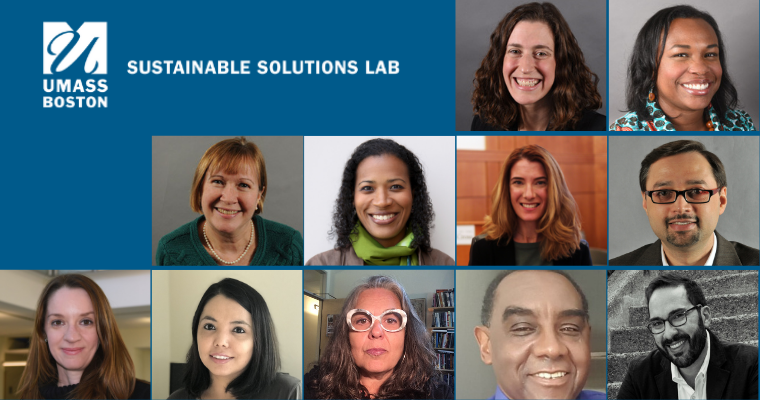SSL awards second round of seed grants and summer funding for anti-racist research
"We are excited to support research that is integral to expanding the narrative and can lead to actionable change."

The Sustainable Solutions Lab (SSL) has awarded its second round of seed grants to two research projects exploring the employment and maternal health impacts of climate change on lower-income and minority communities. The projects, selected out of a highly competitive pool, received $7,500 through funding from SSL-affiliate deans.
This summer, with support from the Barr Foundation, SSL is also supporting climate justice research with a focus on issues of race and racism, with stipends of up to $2,500 for faculty and students.
SSL is a groundbreaking, cross-disciplinary partnership of five schools and four institutes across the university and is working to ensure that politically excluded people and communities are safe and healthy in the face of climate change. In addition to funding, seed grant recipients will receive support on proposal development, media outreach, and connections to local stakeholders and climate justice leaders.
“There is a huge experience gap in how climate impacts are felt. Practitioners and policymakers often don't know what more exposed communities are experiencing,” said Rebecca Herst, director of the Sustainable Solutions Lab. “We are excited to support research that is integral to expanding the narrative and can lead to actionable change.”
Keren M. Horn, associate professor of economics, College of Liberal Arts, and Dania V. Francis, assistant professor of economics, College of Liberal Arts, are exploring the employment impacts of natural hazards, particularly for lower-income and minority individuals in their study titled, “Hurricanes, Floods, and Fires: What are the Employment Impacts of Climate Change?”
"Our work will examine how natural hazards, which are becoming increasingly more likely, affect individual employment trajectories,” said Horn. “We are very much looking forward to working with SSL to inform federal policy responses to natural disasters in a way that will lead to more equitable economic recoveries."
Horn and Francis are particularly interested in studying the impacts of these events on those most vulnerable to the negative consequences of climate change, specifically households that have weaker connections to the labor market and fewer personal resources to cushion them from the negative impacts of such a disaster.
Media stories and policies often focus more on property damage and flood insurance rates than on displacement or public health. The second seed grant winner Lisa Heelan-Fancher, assistant professor of nursing, College of Nursing and Health Sciences, is working to fill that gap in focus with her research project titled “Living in an Environmental Justice Community and its Impact on Birth Outcomes.”
Air pollution and climate change have been associated with preterm birth and low birth weight infants, and Black women have the highest rate of preterm birth in Massachusetts. Heelan-Fancher's study will examine the association between living in an environmental justice community in Boston and Suffolk County and its impact on birth outcomes. (An environmental justice community is at increased risk of experiencing disproportionate environmental harms.)
“Our goal is to contribute the needed evidence so that the environmental justice advisory council in Massachusetts can determine how to allocate funding and support for the projects in the areas we will study,” said Heelan-Fancher.
In addition to these newly funded projects, SSL is supporting seven summer research projects listed below. More information is available here.
Ping-Ann Addo, Associate Professor of Anthropology, College of Liberal Arts
Project: Studying the sustainability and homeland conservation practices of Maroon peoples in the Caribbean (read more)
Anne Blaschke, Associate Lecturer, American Studies, College of Liberal Arts
Project: Researching the interconnectedness of outdoor wellness practices, racism and the global climate crisis (read more)
Pratyush Bharati, Professor of Management Information Systems, College of Management
Project: Employing data analytics and artificial intelligence (AI) techniques to conduct an analysis that can help improve climate assessment (read more)
Courtney Humphries, PhD candidate, School for the Environment
Project: Examining existing racial inequities in waterfront development policies and climate adaptation planning in Boston (read more)
Sajani Kandel, PhD candidate, School for the Environment
Project: Researching the unique heat adaptation needs of BIPOC and low-income residents in Dorchester (read more)
Betsy L. Sweet, Assistant Professor of Equitable and Sustainable Development
Project: Exploring traditional indigenous knowledge in Mexico and the erasure of Black and Native epistemologies in the face of climate change (read more)
Tony Van Der Meer, Senior Lecturer II of Africana Studies, College of Liberal Arts
Keith Jones, Visiting Assistant Professor of Africana Studies, College of Liberal Arts
Project: Furthering the broader campus community's understanding of how climate justice is deeply related to the social, economic and public health crises of our present moment (read more)
About Sustainable Solutions Lab
The Sustainable Solutions Lab at UMass Boston is an applied research and action center working towards more equitable and sustainable responses to climate change. As our climate changes, SSL’s mission is to keep people, their homes and their communities safe and healthy. We are a groundbreaking, cross-disciplinary partnership of five schools and four institutes across the University: the Collaborative of Asian American, Native American, Latino, and African American Institutes (CANALA), College of Liberal Arts, College of Management, College of Nursing and Health Sciences, John W. McCormack Graduate School of Policy and Global Studies, and School for the Environment. For more information: visit www.umb.edu/ssl.
For more information contact Rebecca Herst at rebecca.herst@umb.edu.